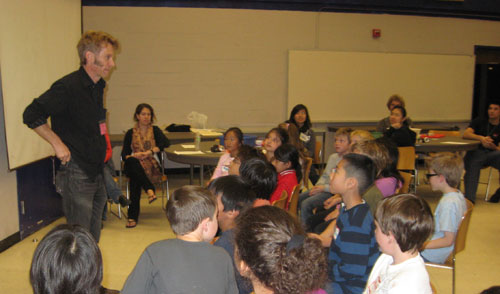
COMMUNICATING SCIENCE © 2011 the Regents of the University of California

Targeted at undergraduate and graduate students, the Communicating Science course introduces chemistry, physics, and astronomy majors to the skill and excitement of effectively teaching science to elementary school children through inquiry and research-based strategies. The course has been used to fulfill requirements for both undergraduate science majors and the university-wide requirement for graduate students to complete a course in teaching methods. It has also served as a powerful vehicle for partnerships of science educators, from both formal and informal settings, with university science faculty who are interested in broadening their educational impact by supporting local outreach programs in schools.
One could say that the Communicating Science course was designed in response to a widespread frustration with attending lectures about how not to lecture students. Many education experts in college courses continue to rely heavily on “telling” information to their students, despite findings that other methods are more effective for learning. The premise advanced in the course is that if there are recognized best practices for students to learn about science, then similar, if not the same, pedagogical approaches can be used with adults to learn about teaching science.
Current pedagogical theory is elegantly reflected in the structure and methodology of each session of this course. The sessions are designed to “practice what we preach,” with the instructors employing the same teaching strategies with participants that the participants are recommended to use with children. Hands-on, minds-on science instructional materials developed by Lawrence Hall of Science are modeled throughout the course and provide a window for participants to learn about important educational topics such as:
With research-based approaches in hand, participants then present six science lessons, teaching one to two hours per week in a local classroom with a partner. By sending college students into classrooms, Communicating Science focuses on the importance of teaching inquiry-based science and is a powerful method of reaching young children with quality science education programs. Participating in the course also gives college science students a unique opportunity to work with classroom teachers, and to gain an appreciation for how to effectively engage and instruct children in science.